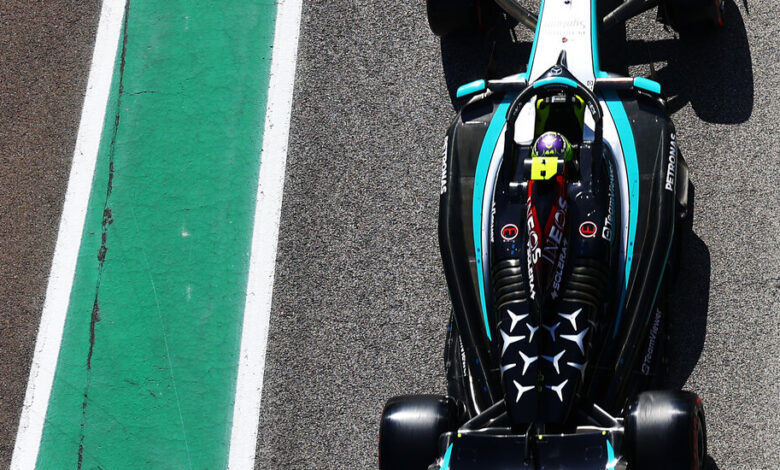Mercedes’s Formula 1 Team, Once Dominant, Is Now Struggling

The once all-conquering Mercedes-AMG Petronas F1 team is in a rut.
It is a distant fourth in Formula 1’s constructors’ championship, and most of its race results this year have been in the lower half of the top 10.
“We have to accept that we are the fourth-fastest team at the moment,” George Russell, one of the team’s drivers, said earlier this month in a media session after the Miami Grand Prix. “The lap times don’t lie, the championship doesn’t lie, this is where we are. We’re fighting for the P5 to P8 region week in, week out right now.”
Mercedes won a record eight successive constructors’ championships from 2014 through 2021. Mercedes and Ferrari battled for best-of-the-rest honors in 2022 and 2023. Ferrari beat Mercedes to second position in 2022, before Mercedes narrowly repaid the favor in 2023. The last time it won a Grand Prix was in Brazil in 2022.
But 2024 has been Mercedes’s worst start to a season since 2011.
Mercedes retained faith in its 2022-spec design concept into 2023 before recognizing at last year’s first race that it had erred, but the team has still not fixed the car.
Mercedes did not expect to catch the dominant Red Bull, but it has fallen away from Ferrari, and an ever-improving McLaren is third. The three leading teams have already won races this year, and McLaren’s turnaround from also-rans to winners has further amplified Mercedes’s stagnation because it supplies McLaren with its power units.
Mercedes’s 2024 car is more balanced compared with its predecessor, but it is sensitive to slight changes in track conditions, further hampering the team’s understanding of the car. The early rounds were spent experimenting with different setups in an elusive quest for a breakthrough.
Sensors on the car as well as virtual modeling, pointed to an increase in downforce, but without the anticipated greater performance. This perplexed the team further, suggesting its measurement tools were misfiring, and the outcome was Mercedes steering down blind alleys as it tried to untangle the problem.
“We know that probably some of the changes we’ve made since the end of last year perhaps overcompensated with some of the development items we did,” Russell said. “We have limitations with the car now, which is a totally different limitation to what we had this time 12 months ago. We did so much work to solve the problems. We’ve kind of gone too far in that direction. So we know we need to improve, and we need to improve quickly.”
Mercedes is gradually understanding those limitations and update packages were introduced at the last two rounds, but gains are relative.
“The issue at the moment is everyone else is developing their cars, so you saw McLaren with a big package [in Miami], and they look to have moved forward,” Andrew Shovlin, the trackside engineering director of Mercedes, said. “The handling issues that the drivers are having to battle with are making it hard to really see all that performance as a straight sort of step forward.”
“What we tend to find,” he added, “is that the car from session to session can behave quite differently, and until we get on top of that, we are always going to blunt the benefit that we can get from these types of updates. A lot of hard work is going on, but hopefully we will start to see the fruits of that soon.”
These updates are not likely to transform Mercedes back into a contender soon.
“We are not expecting we are going to go to Monaco and suddenly be looking extremely quick,” Shovlin said. “We all do all the normal preparation work, but fundamentally, we need to develop our way out of this problem by bringing performance updates to the car. That is what we are working on. And then at the track, we will just try and optimize what we have got as best we can, pick up as many points as we can in the meantime.”
Toto Wolff, the team principal, said Mercedes now at least “understands much more what is needed to get the car in a better space” and “why we struggle and where we struggle.”
“It’s been a painful, painful learning curve, and it’s still not satisfactory, but the situation is more encouraging now,” he said.
Mercedes’s task is to improve the car, and then produce a stronger one for 2025. And if that weren’t enough, the team also has to find a replacement for its star driver, Lewis Hamilton, who will be leaving the team a year early to join Ferrari for 2025.
Hamilton, who has won seven drivers’ titles, has raced for Mercedes since 2013, and his departure will mark the end of a staggeringly successful era, even accounting for the last three underwhelming seasons.
Mercedes must find a replacement for a totemic figure, a scenario it had not anticipated until Hamilton’s bombshell.
Its highly regarded driver, Andrea Kimi Antonelli, 17, of Italy, who is racing in Formula 2, is a contender for the spot, and he has begun private testing with Mercedes.
But Mercedes is not keen to rush his development.
“He needs to concentrate on his Formula 2 campaign,” Wolff said. “He’s doing a lot of testing for us in order to bring him up to speed.”
Carlos Sainz, who will be replaced at Ferrari by Hamilton, will also be available, but because Antonelli is poised to eventually drive for Mercedes, if Sainz is indeed approached he would not likely be offered a lengthy deal.
Wolff had publicly said he would like to land the reigning three-time champion Max Verstappen if he decided to opt out of his contract with Red Bull that runs through 2028. There is no indication that Wolff has spoken to the driver.
“It’s all in his hands,” Wolff said. “He’s the leading driver. He’s the top guy at the moment, and that’s why he needs to make those decisions. There may not be any decision to take. Maybe everything continues as it is. And that’s also guidance for us.”



